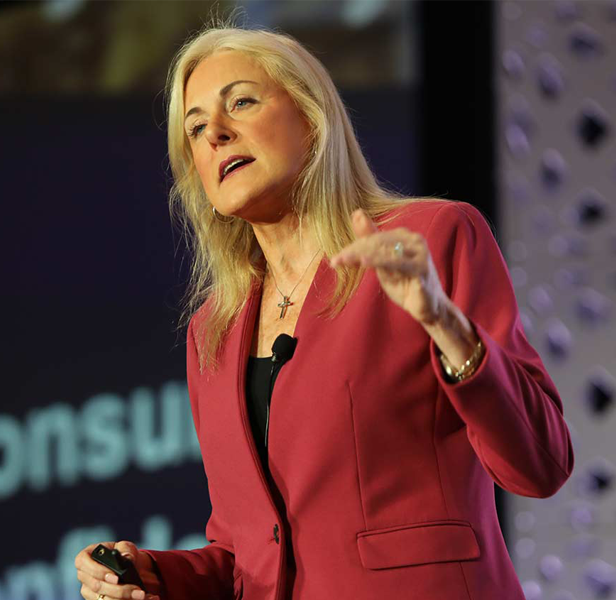October 15, 2024
ASI Power Summit 2024: What To Watch for in the Economy
Economist Mary Kelly told attendees what indicators to watch for and how it will impact their businesses.
Key Takeaways:
• Economic Challenges: Economist Mary Kelly highlighted multiple crises affecting the economy, including inflation, high taxes and geopolitical tensions.
• Consumer Confidence and Interest Rates: While consumer confidence has been volatile, it is expected to improve through the holiday season.
• Strategic Planning: Kelly stressed the importance of having a detailed strategic and succession plan for businesses. She advised attendees to be prepared for unexpected challenges and to ensure their plans are well-documented.
“We are currently in a state of crisis,” declared Mary Kelly at the beginning of her ASI Power Summit talk, which took place on the first full day (Oct. 14) of the ASI Power Summit at the Rancho Bernardo Inn in San Diego. Take your pick – there are economic crises, workplace crises, societal crises and even geopolitical crises. Beyond Israel-Gaza and Russia-Ukraine, there’s also the suggested threat of China invading Taiwan. “If China militarily goes into Taiwan, it’s going to be a 10% global drop in GDP, and it will affect your business,” said the economist and retired Navy commander who spent 20 years in active duty for intelligence and logistics.
Even though things aren’t great, the author, decorated speaker and CEO of Productive Leaders informed attendees about what to expect with the economy and how they should plan for the months ahead.

Economist Mary Kelly laid out what attendees should expect with the economy in the months ahead.
Taxes: Despite campaign rhetoric, taxes aren’t likely to go down. Kelly noted that property taxes have increased due to higher housing prices, and both corporate and individual income taxes are likely to see changes. Kelly emphasized that these tax increases are adding to the financial stress faced by many Americans, particularly homeowners, who are seeing a significant portion of their wealth tied up in real estate.
Inflation: Another source of great concern, inflation has outpaced wage increases, and people are feeling the stress. In January of 2020, 49% of Americans said they were living paycheck to paycheck. Now, it’s over 70%. Labor costs are going up too, and it’s going to force companies to make hard decisions. Kelly said to expect inflation to finish about 3% next year, and to be around 2% next year (which is the annual target rate as set by the Fed).
Consumer Confidence: While consumer confidence has been down, it’s improved over the summer and will continue to tick up through the holiday season. (“We can never discount the Santa Claus effect when it comes to how people feel about finances,” remarked Kelly.) And while the stock market is doing really well, people are still anxious over their finances. Why? It’s in the math. People who had $100 in 2022 and lost 20% now had $80. And when the stock market goes back up 20%, you only have $96. “Consumer confidence is a roller coaster,” Kelly emphasized, “and a lot of your clients are buying from you based on how they feel in the moment and how confident they are.”
Economist Mary Kelly discusses the crises we’re facing, consumer confidence and the first steps businesses should take.
Interest Rates: While interest rates are expected to come down, “the Fed is not going to drop them again probably until March because they won’t have to,” said Kelly because the focus is going to be on the election.
National Debt: America’s debt currently stands at $35 trillion. If each of those dollars were a second, it would equal 30,000 years – or how long humans have been on the planet Earth. The debt-to-GDP ratio continues to escalate and interest on the national debt has exceeded all other expenditures, including Homeland Security, defense and international aid. Kelly said this is affecting the government’s ability to invest in other areas.
Job Growth: Kelly highlighted that job growth is currently strong in healthcare, certain government jobs, hospitality and the trades. She emphasized that these sectors are actively hiring and offer good salaries. On the other hand, she expressed concern about the labor participation rate.
Kelly wrapped up by offering her top advice for attendees. “Plan, plan, plan, plan, plan, because you don’t know when you’re going to get hit by a truck,” said Kelly, who was literally hit by a truck this year (but is doing fine). “And a lot of business owners say, ‘I’ve got my plan up here.’ It doesn’t count until you have it [spelled out]. You need a strategic plan, and you need a succession plan.”